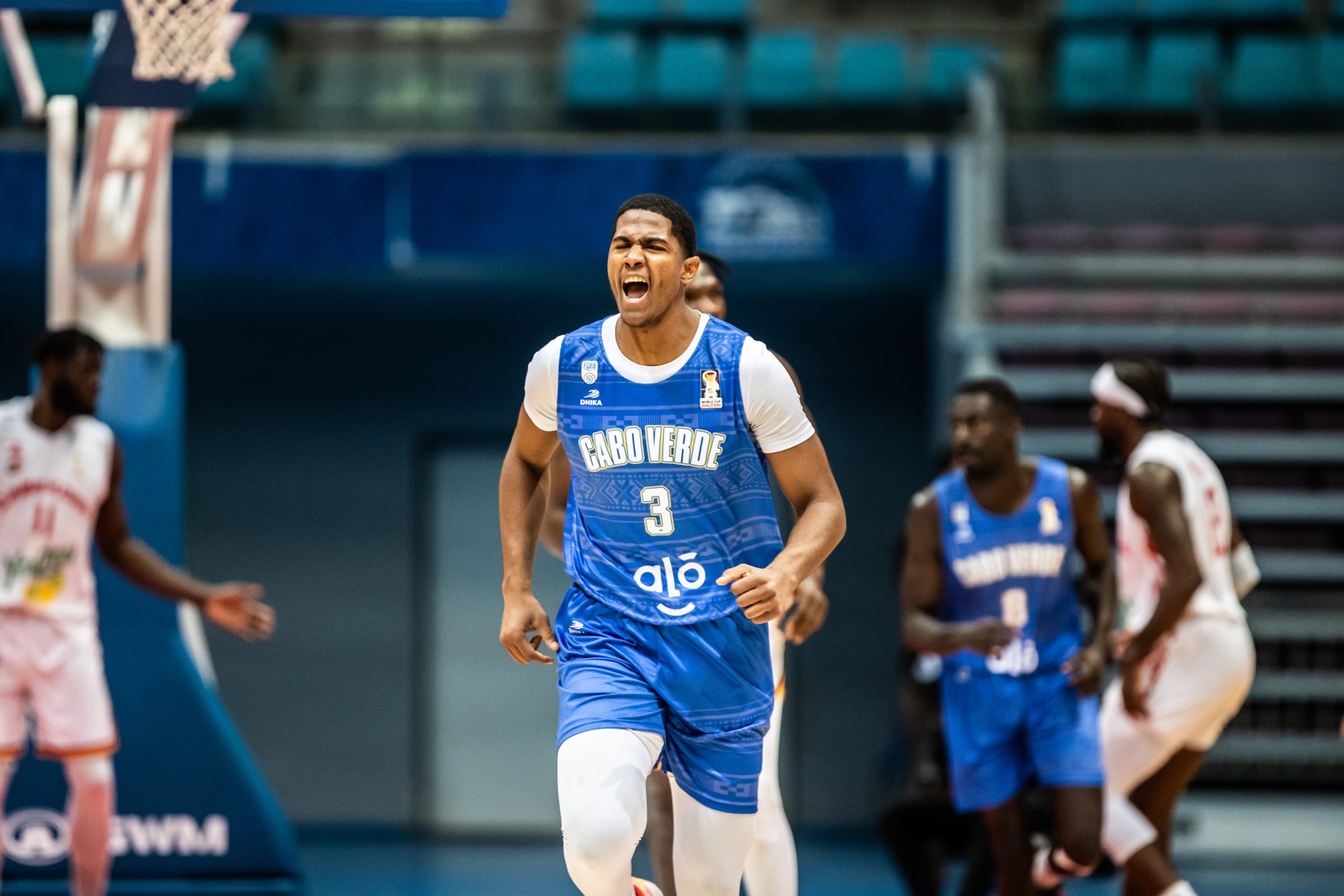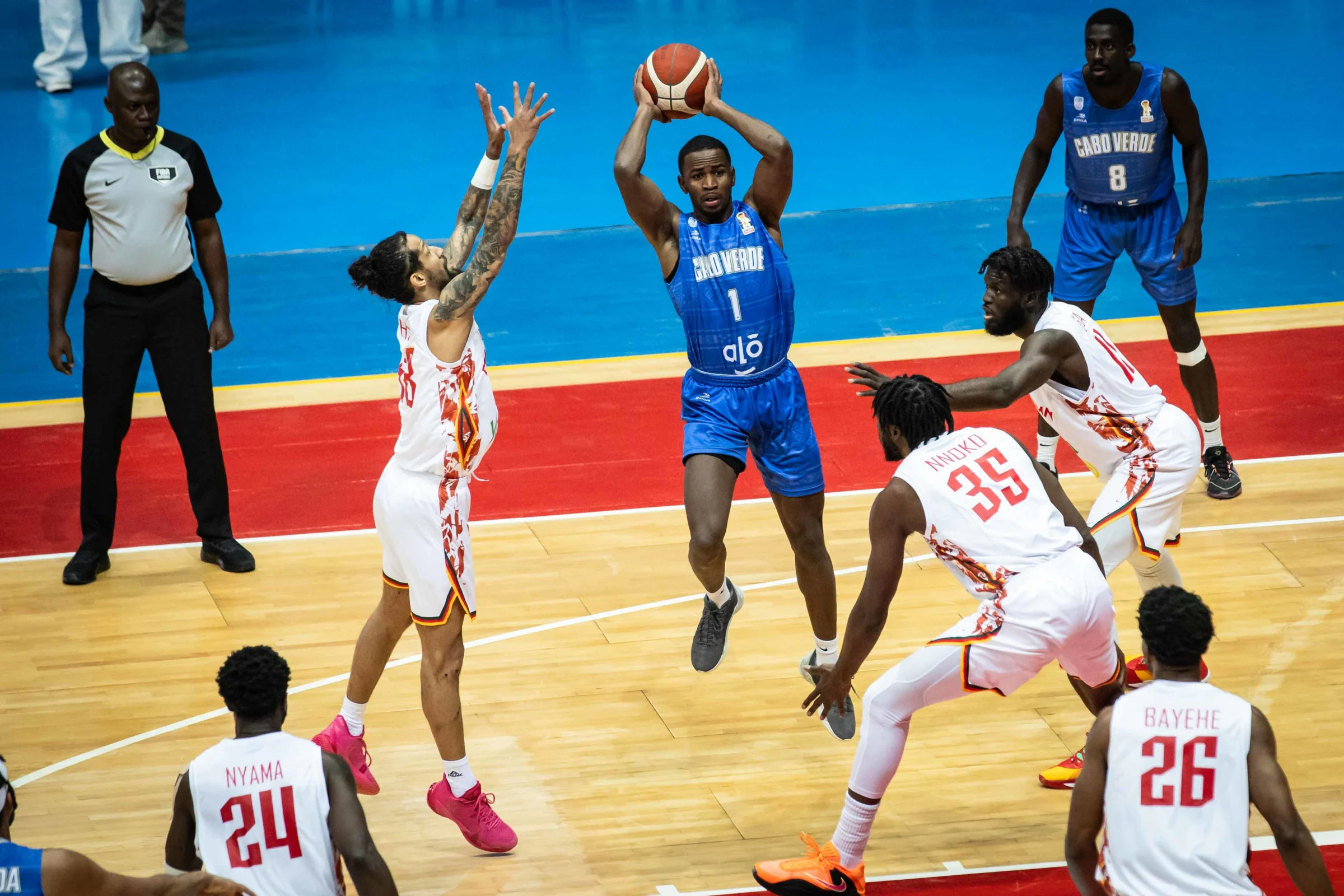Cape Verde overturned a disastrous 10–0 start to outplay Cameroon in Radès, relying on defensive pressure, collective belief and Ivan Almeida’s leadership to seize control early and hold firm through the final quarter of the World Cup Qualifier clash.
Last Updated on
November 27, 2025


Cape Verde walked into the Salle Multidisciplinaire de Radès with four rookies, a new rotation, and a 10–0 deficit that immediately tested the team's balance and maturity. Cameroon opened the game with clarity and physicality, controlling the first quarter 19–12 and pushing Cape Verde into rushed shots, broken possessions and hesitant spacing.
For nearly five minutes, Cape Verde could not buy a basket. Yet what followed was one of the most disciplined in-game recoveries of the opening window of the African Qualifiers.
The shift began late in the second quarter, when Cape Verde ramped up their defensive intensity, forced turnovers, and finally found meaningful rhythm in transition. Their 26–17 run in that period not only erased the early damage but also flipped the game's emotional tone.

Cameroon, which had looked fluid and confident in the opening minutes, suddenly found itself reacting, adjusting, and backpedalling. Cape Verde went into halftime with momentum, and once they sniffed control, they never surrendered it again.
No one embodied that transformation more thoroughly than Captain Ivan Almeida. His shooting percentages never truly stabilised, but his impact was felt everywhere else, on the glass, in playmaking, in leadership, and in the way he kept the group locked into the plan.
He ended the night with 20 points, 11 rebounds and eight assists, one of the most complete performances of the evening.
Reflecting on the rocky opening, Almeida said, “We had a slow start, but the ball wasn’t falling in. And this is a new team, with four rookies.”
Instead of panicking, he anchored the team emotionally and reminded them of who they needed to be.
“Our motto is to never give up. We stuck to the plan, adjusted defensively to pick up the lead.”
Cape Verde’s defensive insistence created structure, confidence and extra possessions. They finished the game with 13 steals, many of them leading directly to open-floor opportunities. Their ball movement, marred in the first quarter, revitalised itself with 23 assists overall, a number that demonstrated how they avoided forcing the game and instead allowed it to flow back toward them.

Almeida noted that composure was essential in the closing period as Cameroon attempted to mount a final push.
With poise, he explained, “In the fourth quarter, we took care of the ball. The young guys who are here made mistakes; we all did. But we’re teaching them never to give up and keep the focus on winning.”
When the tension peaked at the five-minute mark, he revealed the message that stabilised the entire group.
“At the five-minute mark, we had a timeout, and the coach said, ‘Stay together, the shots will fall.’ And this is what we did. In this team, everybody believes in each other. If we focus on ourselves, we’ll get the job done.”
Around him, several pieces clicked into place at the right time. Patrick Lima, with 13 points and seven rebounds, was a steady force on both ends. Joel Almeida supplied 14 points with efficient finishing, while William Brito delivered an unexpected spark with 10 points in just nine minutes, punishing Cameroon’s slow closeouts and defensive rotations.
Cape Verde’s shooting inconsistencies were softened by their decision-making and activity. Their ability to pressure ball-handlers, convert turnovers into 18 points and maintain defensive discipline ultimately overwhelmed Cameroon.
To their credit, Cameroon remained competitive through their interior play. They finished with 50 rebounds, 40 points in the paint and a notable advantage in second-chance scoring. Jeremiah Hill posted 11 points and 10 rebounds, showcasing effort, while Jordan Bayehe added 13 points and 10 rebounds.
Their interior rotation contributed another 13 points with efficient finishing inside. Yet lapses in defensive communication blunted these efforts, a difficult shooting night, especially from the perimeter, and a lack of sustained energy in the second and third quarters.
After the game, head coach Alfred Aboya was direct and honest. He acknowledged the shortcomings with an unfiltered assessment.

“I’m a bit disappointed, but hats off to Cape Verde. I don’t think we showed up today.”
He also highlighted the team’s lack of movement and engagement. For him, the decisive factor was not tactics but effort, a point he made during the post-game press conference.
“I can’t count how many times we had our feet stuck on the floor. We lost in the effort game, we couldn’t create the necessary energy to win.”
The defeat now forces Cameroon to regroup quickly before facing Libya on Day 2, a game that demands immediate correction in intensity and perimeter discipline.
Cape Verde, on the other hand, will head into their matchup with South Sudan with renewed belief, carried by a comeback built on resilience, structure and complete trust in one another, a unity their captain voiced, their coach reinforced, and their performance undeniably validated.
[Photography Courtesy of FIBA]